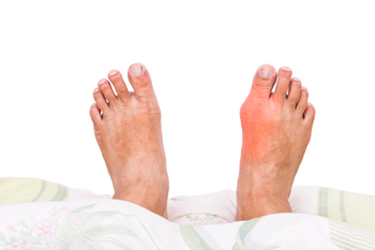 The medical condition that is known as a bunion will typically develop gradually, and it is considered to be a bone deformity. The foot structure can change, and may occur as a result of wearing shoes that do not have ample room for the toes to move freely in. The lack of room may push the big toe toward the second toe, which may cause the joint in the bottom of the big toe to protrude. Additionally, genetic factors and medical conditions that can include arthritis may play a significant role in developing a bunion. Common symptoms that are associated with this condition can consist of pain or numbness, corns and calluses that may develop on the affected area, and the toe may have limited range of motion. If you notice a bunion that is beginning to develop, it is strongly suggested that you schedule a consultation with a podiatrist who can offer treatment techniques.
The medical condition that is known as a bunion will typically develop gradually, and it is considered to be a bone deformity. The foot structure can change, and may occur as a result of wearing shoes that do not have ample room for the toes to move freely in. The lack of room may push the big toe toward the second toe, which may cause the joint in the bottom of the big toe to protrude. Additionally, genetic factors and medical conditions that can include arthritis may play a significant role in developing a bunion. Common symptoms that are associated with this condition can consist of pain or numbness, corns and calluses that may develop on the affected area, and the toe may have limited range of motion. If you notice a bunion that is beginning to develop, it is strongly suggested that you schedule a consultation with a podiatrist who can offer treatment techniques.
If you are suffering from bunions, contact one of our podiatrists of New York Foot and Ankle. Our doctors can provide the care you need to keep you pain-free and on your feet.
What Is a Bunion?
A bunion is formed of swollen tissue or an enlargement of boney growth, usually located at the base joint of the toe that connects to the foot. The swelling occurs due to the bones in the big toe shifting inward, which impacts the other toes of the foot. This causes the area around the base of the big toe to become inflamed and painful.
Why Do Bunions Form?
Genetics – Susceptibility to bunions are often hereditary
Stress on the feet – Poorly fitted and uncomfortable footwear that places stress on feet, such as heels, can worsen existing bunions
How Are Bunions Diagnosed?
Doctors often perform two tests – blood tests and x-rays – when trying to diagnose bunions, especially in the early stages of development. Blood tests help determine if the foot pain is being caused by something else, such as arthritis, while x-rays provide a clear picture of your bone structure to your doctor.
How Are Bunions Treated?
- Refrain from wearing heels or similar shoes that cause discomfort
- Select wider shoes that can provide more comfort and reduce pain
- Anti-inflammatory and pain management drugs
- Orthotics or foot inserts
- Surgery
If you have any questions, please feel free to contact one of our offices located in Franklin Square, Bethpage, Bronx, and Brooklyn, NY. We offer the newest diagnostic and treatment technologies for all your foot care needs.
Read more about Bunions